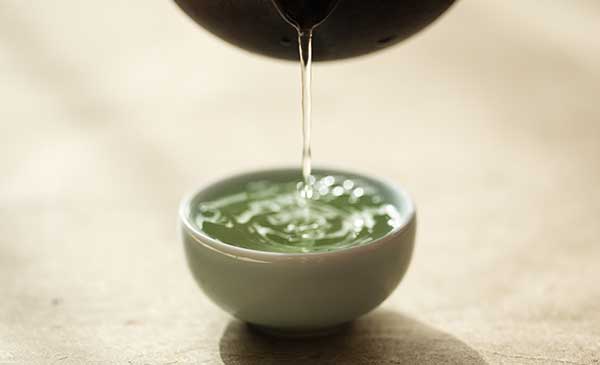Does Green Tea Have Caffeine?

Mornings and caffeine just seem to go together, right? Some people beeline for the coffee for their daily jolt. But if you are like me and want to avoid the dreaded jitters of coffee, then you can get your morning kick started just as well with a cup of tea. I also prefer the variety of flavors that loose leaf tea provides.
It's well known that black tea contains caffeine, yet green tea is a favorite of many tea drinkers. Can green tea provide the caffeine we're after? The simple answer is yes, it can. But there's more to it. Read on and find out why.
What is Green Tea?
Although coffee is quite the current craze, green tea actually has a much longer history than coffee. Historians have dated the origin of green tea as far back as 3000 years ago. People in Southeast Asia would pick the leaves and chew them. It was many years later before they discovered the flavor the leaves created when steeped in water.
Both green and black tea come from the Camellia Sinensis plant. The reason the teas have such different flavors is simply due to the processing method. Black tea is allowed to fully oxidize (or dry out) during processing which turns the leaves black. Black tea will have a darker or red color with a sweet, bold flavor.
To produce green tea, the leaves are heated immediately after being picked reducing the oxidation process. This results in fresher leaves that retain the natural green color. The low oxidation is responsible for the distinct flavor and golden color in your cup.
Why is Green Tea so Good for You?
You may have heard that green tea is a healthy choice, but do you know why? Studies have shown that people that drink green tea have lower cholesterol and healthier blood vessels which help improve blood flow. Green tea has also been studied for the prevention of other heart-related issues such as high blood pressure and congestive heart failure.
And who doesn't want to have a healthier brain? Your brain also benefits from healthy blood vessels. Research has revealed that green tea can help block plaque formation which has been linked to Alzheimer's disease.
Green tea doesn't stop there. It also may help stabilize blood sugar in diabetics.
Does the Lack of Oxidation Reduce the Caffeine in Green Tea?
No, oxidation does not control the amount of caffeine in tea. Even though green and black tea vary in the amount of oxidation, both green and black tea contain caffeine. And because they both come from the Camellia Sinensis plant, they also both contain the amino acid L-theanine with green tea having slightly more than black tea.
Why is this important? Because L-theanine is believed to be responsible for triggering neurotransmitters in the brain, creating a relaxed state of alertness.
These mood-enhancing neurotransmitters (dopamine and serotonin) result in a boosted mood, quicker reaction time, and improved short-term recall. L-theanine creates a steady release of stimulation, as opposed to a jolt. This creates a more gentle caffeine effect, avoiding the hyper feeling you can get from coffee (which does not contain this amino acid, nor the myriad of other health benefits of tea.)
How Much Caffeine is in Green Tea?
The answer to this depends on several variables: the type of tea, whether it is a pure tea or a green tea blend, the proportion of leaves to water, and brewing time. But here is a comparison of average caffeine content in a cup of green tea vs black tea vs a cup of coffee:
- Green Tea - 35 mg of caffeine / 8oz cup
- Black Tea - 50 mg of caffeine / 8oz cup
- Coffee - 95 mg of caffeine / 8oz cup
Matcha (pure green tea powder) is similar to black tea when it comes to caffeine levels. Produced from tea bushes grown in the shade, the matcha leaf retains more caffeine. Plus, when you drink Matcha green tea you are consuming the entire leaf that has been ground up into powder form, instead of just the extracted caffeine in the steeping process. Again, the level of caffeine in matcha can also vary depending on how it is processed and prepared. Learn more here.
Steep So You Can Sleep
Even though green tea has less caffeine than the alternatives, drinking green tea does have an energizing effect. If you are sensitive to an afternoon dose of caffeine or trying to reduce your caffeine intake, be mindful of this fact if you struggle to fall asleep.
For evening relaxation, avoid the effect of caffeine by switching to a naturally caffeine-free Rooibos tea such as Dancing Vanilla Bean, Blueberry Rooibos, or Nectar Nirvana. Or another caffeine-free option to enjoy would be a tisane such as Tranquil Peach, Passion Tango, or Perfectly Pomegranate. Some herbal teas are caffeine-free as well, but this is not a steadfast rule, so be sure to check that out before you steep.





